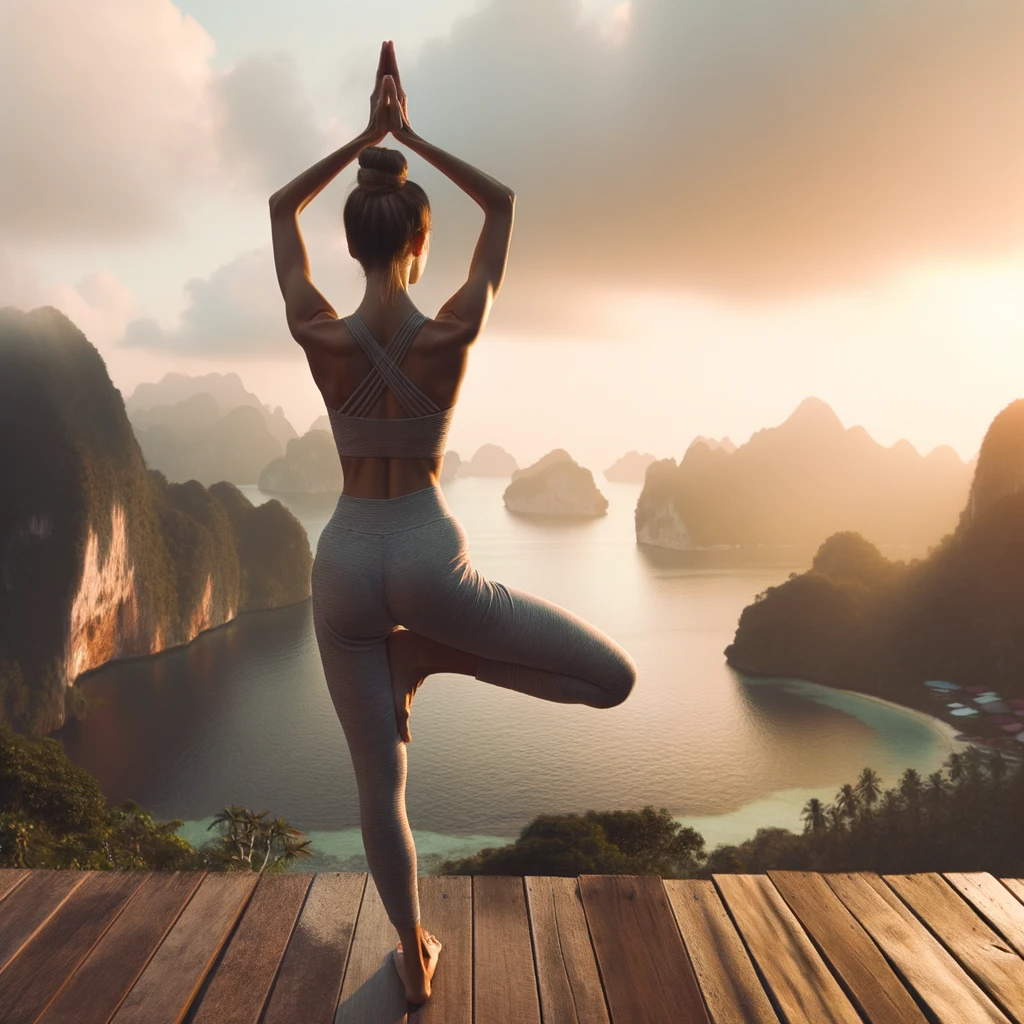Introduction
In today’s fast-paced world, mental health has become a paramount concern for individuals across the globe. The stresses of daily life, combined with the challenges of maintaining a work-life balance, can take a toll on our mental well-being. It’s no surprise that many are seeking holistic approaches to alleviate these mental strains. Enter yoga, a time-honored practice that has been championed for thousands of years for its myriad benefits on both the body and mind.
Yoga, derived from the Sanskrit word “Yuj,” means to bind or unite. At its core, yoga seeks to create a harmonious connection between the mind, body, and spirit. This union can be particularly impactful when addressing mental health issues. By focusing on breath control, meditation, and specific postures, yoga offers a natural remedy to combat anxiety, stress, depression, and other mental health challenges.
The focus on the “Best Type of Yoga for Mental Health” seeks to highlight those specific yoga practices most effective in promoting mental well-being. While all forms of yoga offer benefits, certain styles and postures are particularly potent in addressing specific mental health concerns. As we delve deeper into this topic, we’ll explore these styles, understanding their unique attributes and how they can serve as invaluable tools in the quest for mental harmony.
By incorporating the practice of yoga into one’s daily routine, individuals can not only improve their physical health but also fortify their mental resilience. As research continues to support the profound impact of yoga on mental health, it’s clear that this ancient practice holds contemporary relevance, providing a holistic approach to mental wellness in our modern world.
Table of Contents
Best Type Of Yoga for Mental Health
Yoga, with its deep roots in ancient Indian traditions, has evolved over centuries into various styles, each offering its unique set of benefits. When we address the question, “Which is the Best Type of Yoga for Mental Health?”, it’s essential to understand that the answer isn’t one-size-fits-all. Different styles resonate with different individuals, and what might work for one person might not necessarily be the best fit for another. However, when it comes to mental disorders, certain yoga practices stand out for their profound impact on mental well-being.
1. Hatha Yoga: Often considered the foundation of all yoga types, Hatha Yoga is a blend of physical postures (asanas), breathing techniques (pranayama), and meditation. Its gentle pace and emphasis on mindfulness make it an excellent choice for beginners and those battling anxiety or depression.


2. Vinyasa Yoga: Also known as “flow yoga”, Vinyasa is characterized by a series of fluid movements that synchronize with the breath. This dynamic practice can be particularly therapeutic for those feeling stagnant or stuck in their mental patterns, offering a sense of renewal.


3. Kundalini Yoga: This style focuses on awakening the “Kundalini energy” at the base of the spine through specific sets of exercises, meditations, and chants. It’s especially beneficial for those seeking a deeper spiritual connection and emotional release.


4. Restorative Yoga: As the name suggests, this practice is all about relaxation. Using props like bolsters and blankets, practitioners hold poses for extended periods, allowing the body and mind to deeply relax. It’s a top pick for combating stress and insomnia.


5. Yin Yoga: This slow-paced style involves holding postures for longer durations, targeting the connective tissues in the body. On a mental level, it teaches patience, resilience, and introspection, making it a favored choice for managing mental fatigue and burnout.
In conclusion, the “Best Type of Yoga for Mental Health” largely depends on an individual’s specific needs and preferences. While the styles mentioned above are particularly effective for various mental disorders, it’s crucial to approach yoga with an open mind and heart. Experiment with different styles, listen to your body, and find the practice that resonates most with you. After all, the journey of yoga is deeply personal, and its ultimate goal is to bring harmony to both the mind and body.
The Mental Health Benefits of Yoga
Yoga, a practice with ancient origins, has long been revered for its transformative effects on the body. However, its profound impact on mental well-being is gaining increasing recognition in the modern world. As we delve into understanding the “Best Type of Yoga for Mental Health,” it’s essential to highlight the core mental health benefits that this holistic practice offers.
The Mind-Body Connection:
At the heart of yoga lies the principle of unity – the idea that our minds and bodies are not separate entities but deeply interconnected facets of our being. Through the practice of yoga, individuals cultivate a heightened awareness of their physical sensations, breath, and thoughts. This mindfulness fosters a deep connection between the mind and body, allowing practitioners to tune into their inner selves. By synchronizing breath with movement in yoga postures, one can anchor their attention in the present moment, distancing themselves from the distractions and chaos of the external world. This harmonious mind-body relationship paves the way for improved mental clarity, focus, and self-awareness, essential components for overall mental well-being.
Stress Reduction:
In today’s fast-paced world, stress has become a ubiquitous challenge. Chronic stress can lead to elevated cortisol levels, a hormone linked to various health issues, including anxiety, depression, and sleep disturbances. Yoga, with its emphasis on deep breathing and relaxation, serves as a natural antidote. Specific yoga postures and pranayama (breathing techniques) have been shown to reduce cortisol levels, promoting a sense of calm. Furthermore, the meditative aspects of yoga encourage the mind to let go of worries and immerse in the present, further alleviating stress and promoting a state of tranquility.
Enhanced Mood and Emotional Balance:
Mood fluctuations and emotional imbalances can often be traced back to neurotransmitter levels in the brain, specifically serotonin and dopamine. Yoga, with its combination of physical postures and meditation, has been found to positively influence these neurotransmitter levels. The practice stimulates the production of serotonin, often termed the “happiness hormone,” leading to improved mood and optimism. Simultaneously, the meditative elements of yoga help regulate dopamine levels, responsible for pleasure and reward. As a result, regular yoga practitioners often report enhanced emotional stability, resilience, and an overall more positive outlook on life.
In sum, the mental health benefits of yoga are vast and varied. Whether you’re seeking to strengthen the mind-body connection, combat stress, or uplift your mood, yoga offers effective tools to achieve these goals. As we continue to explore the “Best Type of Yoga for Mental Health,” it becomes evident that this ancient practice holds immense promise for modern-day mental well-being challenges.
Answering the Question: Is Yoga Good for Mental Health?
The age-old practice of yoga, with its intricate blend of physical postures, breathing exercises, and meditation, has been a subject of intrigue and exploration for many. In the quest to determine the “Best Type of Yoga for Mental Health,” it’s pivotal to address a fundamental question: Is yoga genuinely beneficial for mental health? To answer this, we turn to both scientific research and the lived experiences of countless yoga practitioners.
Scientific Studies on Yoga and Mental Health:
Over the past few decades, a plethora of studies have delved into the impact of yoga on mental well-being. Many of these studies have consistently demonstrated that yoga can lead to significant reductions in symptoms of depression, anxiety, and stress. For instance, a study published in the Journal of Clinical Psychology found that individuals who engaged in an eight-week yoga program displayed significant decreases in symptoms of anxiety and improved mood. Another research, focusing on the physiological aspect, discovered that yoga could reduce cortisol levels, the body’s primary stress hormone. These findings, coupled with numerous other studies, provide a robust scientific basis for yoga’s positive effects on mental health.
Anecdotal Evidence and Personal Experiences:
Beyond the realm of scientific research, the world is replete with personal testimonies of individuals who’ve found solace and healing through yoga. From individuals battling the demons of depression to those seeking respite from the clutches of chronic stress, many have turned to yoga as a sanctuary. One such story is of Maya, a 32-year-old woman who, after facing a traumatic event, found herself spiraling into a state of despair. For Maya, yoga was not just an exercise but a lifeline. Through consistent practice, she found the strength to rebuild her life, stating, “Yoga didn’t just improve my mental health; it transformed it.”
Testimonials and Success Stories:
Across yoga studios, wellness retreats, and online platforms, countless testimonials echo the transformative power of yoga. Sarah, a corporate executive, shares, “Yoga became my refuge from the relentless pressures of work. It gave me clarity, focus, and an inner peace I never thought possible.” Similarly, Raj, who battled anxiety disorders for years, found stability through yoga, claiming, “Every session brought me closer to inner calm, and over time, the anxiety spells reduced dramatically.”
In conclusion, the evidence, both scientific and anecdotal, overwhelmingly supports the notion that yoga is indeed beneficial for mental health. As we delve deeper into understanding the “Best Type of Yoga for Mental Health,” it becomes abundantly clear that this ancient practice offers a holistic and effective approach to mental well-being in today’s complex world.
How to Practice Yoga for Mental Well-being
Embarking on a journey with yoga, especially with the intent of enhancing mental well-being, requires more than just learning a set of physical postures. The essence of yoga transcends the physical, delving deep into the realms of the mind and spirit. As we explore the “Best Type of Yoga for Mental Health,” it’s essential to understand the foundational steps to effectively practice yoga for mental well-being.
Setting Up Your Space:
The environment in which you practice yoga plays a pivotal role in determining the quality of your experience. A serene, clutter-free space can enhance concentration, allowing you to delve deeper into your practice.
Choose a Quiet Spot: Opt for a location away from the hustle and bustle of household activities. A quiet corner, a balcony with a view, or even a peaceful garden can serve as ideal spots.
Personalize Your Space: Infuse your yoga space with items that resonate with tranquility and positivity. Consider adding plants, soft lighting, or even scented candles to create a calming ambiance.
Keep It Clean: A clean environment promotes clarity of mind. Ensure your yoga mat and the surrounding area are clean, inviting a sense of purity and discipline into your practice.
Integrating Breathwork:
Pranayama, or the art of breath control, is a cornerstone of yoga. By mastering your breath, you can achieve a heightened state of mental clarity and calm.
Begin with Basics: Start with simple breathing exercises like ‘Anulom Vilom’ (alternate nostril breathing) or ‘Bhramari’ (bee breath) to calm the mind and balance energies.
Stay Mindful: As you engage in pranayama, maintain acute awareness of each inhalation and exhalation. This mindfulness anchors your mind, steering it away from distractions.
Integrate with Asanas: While practicing postures, synchronize your movements with your breath. This harmonization amplifies the mental benefits of each pose.
Consistency is Key:
Like any discipline, the benefits of yoga magnify with regular practice. Consistency not only enhances physical flexibility but also fortifies mental resilience.
Set a Routine: Dedicate specific times in your day for yoga. Whether it’s the tranquil dawn hours or the serene dusk, choose a time that aligns with your mental energy levels.
Track Your Progress: Consider maintaining a yoga journal. Documenting your experiences, challenges, and breakthroughs can serve as a motivating factor, encouraging consistent practice.
Stay Inspired: Engage with the yoga community, attend workshops, or even explore online classes. Surrounding yourself with like-minded individuals can boost your commitment and passion for the practice.
In essence, practicing yoga for mental well-being is a holistic process. It’s not just about mastering postures but about creating an environment conducive to mental peace, mastering the breath, and dedicating oneself consistently. As you weave these elements together, you’ll find yourself inching closer to discovering the “Best Type of Yoga for Mental Health” tailored for your unique needs.
Tackling Anxiety and Depression with Yoga
The profound healing power of yoga transcends its physical benefits, making significant inroads into mental and emotional well-being. As individuals across the globe grapple with the challenges of anxiety and depression, many are turning to yoga as a holistic remedy. Within the vast spectrum of yoga practices, certain postures and techniques have shown exceptional efficacy in alleviating these conditions. In our quest to unearth the “Best Type of Yoga for Mental Health,” let’s delve deeper into how yoga can specifically address anxiety and depression.
Yoga for Anxiety:
Anxiety, characterized by feelings of unease, worry, and fear, can be debilitating. The mind’s incessant chatter, coupled with physiological symptoms like rapid heartbeat, can be overwhelming. Yoga, with its emphasis on mindfulness and grounding, offers solace to those battling anxiety.
Child’s Pose (Balasana): This restorative pose involves kneeling and bending forward, allowing the forehead to rest on the floor. The pose offers a sense of safety and comfort, akin to returning to a womb-like state, helping soothe the nervous system.
Tree Pose (Vrikshasana): A balancing posture, the tree pose requires one to stand on one leg while the other foot rests on the inner thigh. This pose cultivates focus and grounding, diverting the mind from anxious thoughts.
Breathing Techniques: Practices like ‘Ujjayi Pranayama’ (victorious breath) involve deep and controlled breathing, which can anchor the mind and reduce symptoms of anxiety. The rhythmic inhalation and exhalation serve as a meditative tool, bringing the practitioner to the present moment.
Yoga for Depression:
Depression, a state of low mood and aversion to activity, can affect one’s thoughts, feelings, and overall well-being. The practice of yoga can serve as a beacon of light for those trapped in the shadows of depression.
Sun Salutations (Surya Namaskar): This sequence of postures, synchronized with breath, infuses energy and vitality into the body. The flow enhances blood circulation and stimulates the production of serotonin, uplifting one’s mood.
Bridge Pose (Setu Bandha Sarvangasana): A backbending pose, the bridge pose opens up the chest and heart, promoting better oxygen flow. This rejuvenating posture can counter feelings of lethargy and despondence commonly associated with depression.
Meditative Practices: Guided meditations or ‘Yoga Nidra’ (yogic sleep) can assist individuals in navigating and processing suppressed emotions. These practices offer a safe space to confront and release pent-up feelings, fostering emotional healing.
In conclusion, the journey of yoga offers a plethora of tools to tackle the challenges posed by anxiety and depression. By integrating specific postures, breathing techniques, and meditative practices, one can find a pathway to mental equilibrium and emotional resilience. As we continue our exploration, it becomes evident that determining the “Best Type of Yoga for Mental Health” involves understanding and addressing the unique needs of every individual.
Unveiling Mental Yoga
Amidst the plethora of yoga practices that primarily focus on physical postures and alignment, there lies a lesser-known yet profoundly impactful facet: Mental Yoga. As we navigate the intricate landscape of the “Best Type of Yoga for Mental Health,” it becomes crucial to shed light on this transformative practice, which emphasizes the mind’s well-being and potential.
Definition and Understanding of “Mental Yoga”:
Mental Yoga is not about bending the body into intricate postures but about flexing and training the mind. Rooted in ancient wisdom, it encompasses techniques that foster mental agility, clarity, and focus. Much like how traditional yoga harmonizes the body, mind, and spirit, Mental Yoga seeks to harmonize thought processes, emotions, and mental energies. It is an endeavor to declutter the mind, sharpen intellect, and enhance cognitive capacities.
Practices and Exercises for Mental Clarity and Focus:
Delving into Mental Yoga, we find a treasure trove of practices tailored to rejuvenate the mind:
Meditative Mindfulness: At the heart of Mental Yoga is the practice of mindfulness. It involves immersing oneself entirely in the present moment, observing thoughts without judgment. This heightened awareness cultivates mental clarity and reduces the noise of incessant thoughts.
Visualization Techniques: Harnessing the power of imagination, visualization exercises involve creating mental images to achieve specific outcomes. Whether it’s envisioning a serene beach or imagining the successful completion of a task, these techniques can induce calm and boost confidence.
Mantras and Affirmations: Repeating positive affirmations or mantras can rewire the brain, fostering positive thought patterns. This repetition serves as a mental anchor, grounding the mind and shielding it from negative influences.
Breathing Exercises: While pranayama is commonly associated with physical yoga, its benefits extend to the mind. Techniques like ‘Anulom Vilom’ or ‘Bhramari’ can enhance mental alertness and concentration.
Cognitive Puzzles and Challenges: Engaging the mind in puzzles, brain games, or even intellectual discussions can serve as a workout for the brain, enhancing its agility and problem-solving capacities.
In essence, Mental Yoga offers a comprehensive toolkit to navigate the complexities of modern life with a poised and clear mind. As stress, distractions, and information overload become ubiquitous challenges, the practices encompassed in Mental Yoga emerge as essential components in the quest for the “Best Type of Yoga for Mental Health.”
Key Yoga Postures for Mental Health
The realm of yoga is vast and varied, with countless postures (asanas) catering to different facets of well-being. While each pose has its unique benefits, certain asanas stand out for their profound impact on mental health. As we journey to uncover the “Best Type of Yoga for Mental Health,” it’s essential to spotlight these key postures, understanding their intricacies, and the mental tranquility they offer.
1. Child’s Pose (Balasana):


Benefits: This restful pose allows the mind to turn inwards, offering a moment of introspection and calm. It can alleviate feelings of stress and anxiety, grounding the practitioner and providing a sense of security.
Instructions:
- Start by kneeling on your mat, with your big toes touching.
- Spread your knees apart and sit back on your heels.
- Stretch your arms forward and lower your forehead to the ground.
- Breathe deeply, feeling the expansion of your back with each inhalation.
Precautions: Avoid this pose if you have knee injuries or severe hip issues.
2. Downward Facing Dog (Adho Mukha Svanasana):


Benefits: This invigorating pose rejuvenates the mind, enhances blood circulation to the brain, and can alleviate feelings of depression.
Instructions:
- Begin in a plank position.
- Lift your hips upwards, pushing back, and forming an inverted ‘V’ with your body.
- Keep your hands shoulder-width apart and feet hip-width apart.
- Press your heels towards the ground and lengthen your spine.
Precautions: Those with severe wrist or shoulder injuries should approach this pose with caution.
3. Tree Pose (Vrikshasana):


Benefits: As a balancing pose, the tree pose cultivates focus, concentration, and mental steadiness, helping to clear mental clutter.
Instructions:
- Stand tall with feet together.
- Shift your weight onto one foot and lift the other, placing it on the inner thigh of the standing leg.
- Balance and bring your hands to the heart center or raise them overhead.
- Fix your gaze on a point in front of you and breathe deeply.
Precautions: Avoid if you have severe balance issues or recent ankle injuries.
4. Corpse Pose (Savasana):
Benefits: Often used for relaxation at the end of a yoga session, this pose promotes deep mental relaxation and can reduce symptoms of anxiety and stress.
Instructions:
- Lie flat on your back with arms by your side, palms facing upwards.
- Let your feet naturally splay out.
- Close your eyes and take deep, rhythmic breaths.
- Allow every muscle to relax, sinking into the mat.
Precautions: Those with back issues can place a bolster under their knees for support.
Incorporating these key postures into your yoga routine can be transformative for mental health. They not only offer physical benefits but delve deep into the psyche, promoting mental clarity, balance, and tranquility. As we continue our exploration, these postures underscore the holistic nature of yoga, reaffirming its position as the “Best Type of Yoga for Mental Health.”
Conclusion
As we journey through the myriad facets of yoga, from its ancient roots to its modern-day applications, one truth remains steadfast: the profound impact of this practice on mental well-being. The quest to discover the “Best Type of Yoga for Mental Health” is not merely about identifying a particular style or set of postures. It’s about recognizing the transformative power of yoga, understanding its ability to heal, rejuvenate, and fortify the mind.
The intricate dance between mind, body, and spirit that yoga fosters is unparalleled. Each asana, each breath, and each moment of meditation is an invitation to delve deeper into oneself, to confront and heal the mental scars, and to emerge with a renewed sense of clarity and purpose. Whether it’s the grounding tranquility of Child’s Pose, the focus of Tree Pose, or the deep relaxation of Savasana, every aspect of yoga offers a balm to the turbulent waters of the mind.
For those who are yet to embark on this journey, the world of yoga beckons with open arms. It promises not just physical agility but a mental resilience that is much needed in our increasingly chaotic world. And for those already treading this path, the exploration is endless. There’s always a new horizon, a deeper layer of understanding, a higher peak of mental tranquility to achieve.
In conclusion, the “Best Type of Yoga for Mental Health” is not a one-size-fits-all answer. It’s a personal journey, unique to each individual, shaped by their needs, experiences, and aspirations. But one thing is certain: yoga, in all its forms, offers a sanctuary for the mind, a place of healing, growth, and infinite peace. So, whether you’re a seasoned practitioner or a curious novice, let the journey of yoga be your guide, lighting the path to mental harmony and well-being.
Appendix: Additional Resources
For those who are keen on delving deeper into the realm of yoga and its impact on mental health, a plethora of resources await. From enlightening books penned by seasoned yogis to interactive workshops that offer hands-on experience, the journey of exploration is endless. Here’s a curated list of resources to aid you in your quest to uncover the “Best Type of Yoga for Mental Health.”
Recommended Reading:
“The Heart of Yoga: Developing a Personal Practice” by T.K.V. Desikachar – A comprehensive guide on yoga philosophy and practice.
“Light on Yoga” by B.K.S. Iyengar – A classic tome that delves deep into yoga asanas, breathing techniques, and the spiritual aspect of the practice.
“Yoga for Depression” by Amy Weintraub – A look into specific yoga practices that can alleviate symptoms of depression and uplift the spirit.
“The Key Muscles of Yoga” by Ray Long – A blend of anatomy and yoga, offering insights into how different postures benefit both body and mind.
Online Classes:
Yoga International – A vast library of online classes catering to various levels and styles of yoga, with a special focus on mental well-being.
Glo Yoga – Tailored courses that address specific mental health issues like anxiety, stress, and depression.
Mindful Yoga Therapy – An online platform dedicated to using yoga as a therapeutic tool for veterans and individuals dealing with trauma.
Workshops and Retreats:
Kripalu Center for Yoga & Health – Located in Massachusetts, this center offers specialized workshops on yoga for mental health.
Yogaville – A serene retreat in Virginia that conducts immersive workshops on yoga, meditation, and their role in promoting mental well-being.
The Art of Living Retreat Center – Nestled in the Blue Ridge Mountains of North Carolina, this center offers workshops that blend yoga with holistic healing practices for mental rejuvenation.
As you navigate through these resources, remember that the journey of yoga is deeply personal. What resonates with one individual might differ for another. The key is to remain open, curious, and receptive, allowing the ancient wisdom of yoga to illuminate the path to mental harmony and well-being.

